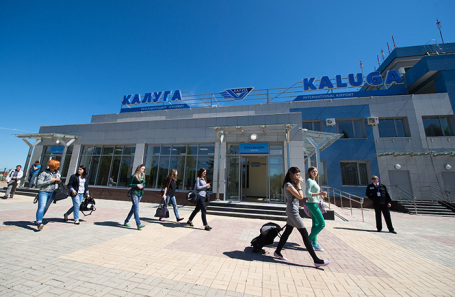
Over the recent weekend, Russia`s skies experienced significant disruption as hundreds of flights were cancelled, delayed, or diverted. The cause: the implementation of the “Kover” (Carpet) plan, a protocol enacted at airports during potential drone threats or unauthorized aircraft activity. This measure led to widespread airspace restrictions, effectively paralyzing air connections in several key regions.
The impact was substantial, particularly felt at Moscow`s Sheremetyevo airport, which saw over 170 cancellations by Sunday evening, in addition to numerous delays and postponements. This left thousands of passengers stranded, facing chaotic scenes.
Passengers described a scene of confusion and frustration. One traveler, who planned to fly to Chelyabinsk, recounted arriving at the airport only to discover their flight was cancelled, with no prior notification from the airline. Facing disorganized queues reportedly stretching to a thousand people across various destinations, they found the situation overwhelming. After waiting for ninety minutes, they independently learned their flight was rescheduled for Monday and opted to return home. Finding alternative tickets on short notice proved nearly impossible, with economy class sold out even several days in advance.
Not everyone could simply go home, leaving many to spend the night sleeping on the airport floor. Amidst the discomfort, a peculiar form of solidarity emerged. In one terminal, a young man pulled out a violin, soon joined by an accordion player. The impromptu performance escalated into a spontaneous singalong, with passengers collectively performing the Soviet era song “Katyusha.” A technical disruption leading to a public singalong of patriotic tunes – a moment of unexpected, perhaps slightly ironic, camaraderie in chaos.
The disruption wasn`t confined to Moscow. St. Petersburg`s Pulkovo airport also experienced significant strain. A notable incident highlighted the extent of the problem: a flight from Sheremetyevo to Pulkovo, originally scheduled for the morning, was repeatedly delayed, eventually departing in the afternoon. Upon approach to Pulkovo, the aircraft entered a “Kover” zone and was forced into a holding pattern before being diverted, rather ironically, back to Moscow, landing at Vnukovo airport.
For those requiring urgent travel between Moscow and St. Petersburg, the strain immediately shifted to railway infrastructure. Tickets for the high-speed “Sapsan” trains sold out by Saturday evening. While the railway operator stated extra carriages were added, industry experts noted this was “catastrophically insufficient” to compensate for the typical weekly air passenger flow of over 50,000 people in one direction. Effectively doubling train capacity would have been necessary to absorb the displaced air traffic.
Airports in other cities, including Nizhny Novgorod, Ivanovo, Kaluga, Pskov, and Tambov, also experienced temporary closures or mass cancellations. According to Russia`s Federal Air Transport Agency (Rosaviatsiya), the delays and cancellations on Saturday alone impacted the travel plans of at least 75,000 passengers.
Legally, passengers affected by delays and cancellations are entitled to certain provisions, such as food, water, and hotel accommodation depending on the duration of the delay. Cancellation of a flight also typically warrants compensation. Furthermore, passengers can potentially seek compensation for consequential losses directly resulting from the disruption, such as missed connecting flights, ruined vacations, or canceled business meetings. Legal experts advise passengers to diligently document the delay or cancellation, obtaining a stamp and signature from an airline representative on their boarding pass or ticket, as proof for any future claims.
Judging by public commentary on social media following the weekend`s events, this experience has prompted many who had planned future air travel to seriously consider alternative modes of transport – cars, trains, anything but flying. The perceived unreliability resulting from drone threats and the subsequent implementation of the “Kover” plan means that, for many, future travel plans might just end up, quite literally, under the carpet.








